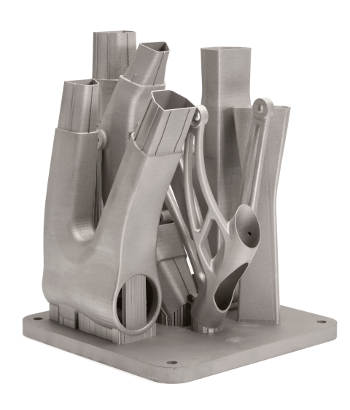Granta Design today announced the release of GRANTA MI:Additive Manufacturing™, a new software solution to overcome the substantial data challenges of developing additively-manufactured parts.
Applying experience from Granta’s involvement in a number of leading Additive Manufacturing projects, MI:Additive Manufacturing incorporates industry best practices in managing vital material and process information in this area.
It helps engineering enterprises: protect their investment and intellectual property in Additive Manufacturing research; build an in-depth knowledge-base that is a prerequisite for better understanding Additive Manufacturing processes; significantly reduce time-to-market by avoiding wasted effort and gaining valuable insights; and support the qualification and certification of additively-manufactured parts.
 Example of an additively-manufactured part, Image courtesy of Renishaw plc.
Example of an additively-manufactured part, Image courtesy of Renishaw plc.
Additive Manufacturing (‘3D Printing’) has huge promise as a technique to make geometrically-complex parts with optimal cost and performance in industries including aerospace, automotive, and medical. Significant investment is being made in research and development programs to realise this potential. But this work generates huge amounts of data about the structure, properties, and processing of the materials involved.
Until now, there has been no easy-to-implement system to capture this data and ensure that it is used effectively across the many disciplines involved: materials suppliers, R&D, part design, simulation, and production. MI:Additive Manufacturing provides a single system, based on the industry-leading GRANTA MI™ materials information management software, which captures all relevant data, links it, makes it available to any appropriately-authorized user, and ensures full traceability.
A typical MI:Additive Manufacturing workflow begins with the import of ‘logfiles’ directly from Additive Manufacturing machines. The system automatically stores process parameters, extracts logged data for specific builds, links this information to supplier data on the batches of material used to make a part, and captures testing and inspection results. This data can feed into statistical analyses that determine mechanical properties.
Properties can be exported to simulation codes and the results can be captured for use in optimizing part design and production. MI:Additive Manufacturing both improves efficiency for many of the individual tasks in Additive Manufacturing research and supports collaboration, sharing knowledge and increasing effectiveness across a whole research program.
At the heart of MI:Additive Manufacturing is the data structure (or ‘schema’) that defines the types of data to be captured in the system, their inter-relationships, and how they might be processed.
This technology, embodying industry best practices, is then combined with the GRANTA MI materials information management tools, which have been proven for the complex management of advanced materials data in dozens of implementations by leading research, design and engineering enterprises worldwide.
One Additive Manufacturing project in which Granta has participated is AMAZE – a multinational collaboration of 28 corporations and research institutions that is developing rapid production of large defect-free additively-manufactured metallic components. Granta technology captures and securely shares knowledge on materials, processes, and properties.
This enables efficient comparison of data, improvement of production knowledge, refinement of processes, integration of simulation activities, and improved coordination of the R&D program. Experience such as this has supported development of the new software package.
MI:Additive Manufacturing combines our core strength in materials information management with practical knowledge of Additive Manufacturing data gained from our collaborative projects, and work with some of our leading customers.
The great news is that this will allow us to help many other customers who have expressed an interest in Additive Manufacturing, and have been asking us for a solution to manage their data in this area.
Dr Patrick Coulter, CEO, Granta Design